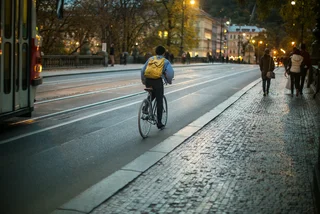A unique new footbridge designed for cyclists and pedestrians will connect Prague's Kačerov and Roztyly neighborhoods, and make getting around the area much easier for those living in Spořilov and other nearby residential areas.
The Kačerov and Roztyly neighborhoods, in Prague 4 and 11, are currently connected by a major motorway but have no easily-navigable pedestrian pathways and limited public transport options. Currently, getting between them is only only easily possible by car or metro.
Tentatively named Bike Snake, the new bridge is modeled after Copenhagen's popular Cykelslangen (Bicycle Snake) bridge, a 220-meter-long pedestrian pathway that opened in the Danish capital in 2014 to solve a similar issue.
Prague's new Bike Snake bridge will form part of a planned north-south cycle path stretching across Prague. It will allow uninterrupted bike travel from Kačerov to Pankrác and connected areas to the north, and from Roztyly to neighborhoods further south.
"Today, it is only possible to get [to these neighborhoods] on foot or by bike via a significantly longer and less convenient route," Adam Scheinherr, Prague's deputy mayor for transport, states in a press release.
"By car and metro, this route is direct, comfortable and has capacity. With the new bridge, we want to offer this option to Praguers who would also choose other modes of transport."

"The construction will connect what have been completely separate parts of the city for pedestrians and cyclists. Tens of thousands of people live and work in the area, and until now it was only possible to travel here by car and public transport."
The footbridge project is currently in its initial phase, with analysis now being conducted before the city offers a public tender for its design and construction.
Under current plants, the north end of the footbridge will lead off of Michelská street in Kačerov near the metro station. It will run parallel with one motorway and over another before reaching the the Spořilov residential area and nearby Roztyly metro station.
The new bridge will be built with the same kind of efficient high-performance concrete that was utilized in the production of the new 3D-printed bench unveiled in Prague 7 last weekend.
"The footbridge will be designed as much as possible from ecological materials, such as wooden beams for the bridge structure, wooden railings, and ultra-high-performance concrete for the bridge deck," adds Scheinherr.
"Thanks to the design of the supporting structure made of ecological material, we will use 70 percent less carbon dioxide in the construction of the bridge."












 Reading time: 2 minutes
Reading time: 2 minutes 
































